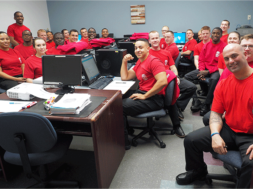
Campus of Distinction
David J. Waldron, Author and Advisor on Organizational, Team, and Individual Effectiveness in Career Sector Education
This is an excerpt from David Waldron’s upcoming book, “A Great Place to Learn & Earn: An Organizational Effectiveness Model for Career Sector Education’s Critical Role in Twenty First Century Workforce Development.” To be published in Softcover on Amazon.com and e-book for Kindle, from Country View. Reprinted with permission. Learn more at davidjwaldron.com.
“Quality is not an act. It is a habit.” – Aristotle
What often lies at the heart of dissension between traditional higher education and for-profit career sector education is the latter’s commitment to putting the student at the center of its universe. The former operates under the premise of faculty centric shared governance, placing the student as an invited guest, albeit a paying one.
Pundits sometimes argue for-profit education puts the investor first. This reasoning has its merits in the legal presumption that publicly held companies must place the interests of shareholders above all else. But in the context of working at the campus level, ground or online, assume the shareholders are taken care of by the corporate office and your attention is where it needs to be: on the well-being of the student as a paying customer.
It is essential to operate a student centric, career sector education campus without compromising the needs of other stakeholders such as owners, management, faculty, staff, employers, vendors, and regulators. A consensus driven culture of teamwork, performance, compliance, and recognition – centered on successful student outcomes – forms the foundation for a company or campus of distinction.
A consensus driven culture of teamwork, performance, compliance, and recognition – centered on successful student outcomes – forms the foundation for a company or campus of distinction.
Teamwork: getting along
Building consensus begins with teamwork. As discussed in Chapter 2, People Before Vision of “A Great Place to Learn & Earn,” hire the best talent available, then allow that talent to drive the bus to greatness per Jim Collins’s Good to Great paradox. Incorporate definitive ways of developing teams driven by accord; groups that enjoy working together to be the best in the world at what its members are passionate about.
I have observed the most productive teams are the ones that debate or argue over policies, ideas, or student welfare. It is because everyone involved, cares. Compassion is an important ingredient for building and sustaining success in a career sector education environment.
Consensus building is most challenging between self-interested departments, sometimes labeled as silos. Well managed career sector schools, colleges, and universities break down silos by encouraging cooperation between department leaders, which then often spreads throughout the ranks.
Management teams that promote openness, constructive feedback, visibility, and trust, will build a one college team united for the betterment of its students and the employers that hire successful graduates.
Facilitating regular communication between departments is another key to building consensus. Unless already doing so, contribute in your own acceptable way to make sure engagements are motivating, productive, and measurable.
Staff meetings play an important role in team building. Faculty in-service between academic terms are crucial for meeting accreditation standards, and are great catalysts for building consensus among instructional staff, including on a cross program basis.
As a rule, consensus building starts at the top with the campus president or director, in partnership with department leaders. Management teams that promote openness, constructive feedback, visibility, and trust, will build a one college team united for the betterment of its students and the employers that hire successful graduates.
Performance: getting it done
I have never worked in a more performance driven culture than found on career sector education campuses. Excellent student outcomes, consistent employer satisfaction, strong regulatory compliance, profitable shareholder returns, and workplace fulfilled faculty and staff are the order of any sustainable career sector education institution. Helping people and making the numbers must coexist for a campus or company to be successful.
Depending on the personality of the employee, people focused or numbers driven, heads spin from the sheer volume of responsibilities. It is a work environment requiring an individual or team’s ability to keep several balls in the air at once. To illustrate, travel a typical career sector education student timeline:
Student enrolls → completes financial aid package → attends orientation → endures add/drop period → survives to the end of each term → to the business office with tuition payments → consults education and financial aid departments to maintain satisfactory academic progress → all the while engaged in classrooms, labs, tutoring and study groups → visits career services for resume review and mock interviews → completes any required externships, internships, or certifications → attends career fairs and employer interviews → begins new career → marches in graduation ceremony → pays down student loans on time → refers new students to alma mater.
In the midst of this integral student activity, the campus and company are committed to a parallel focus on institutional and programmatic accreditation standards; state regulations; Title IV administrative capability; employee recruitment and training; human resource policy; facilities management; information technology infrastructure; campus safety and security; legal disputes; corporate reporting requirements; student services; and the ever expected, although specifically unexpected, interruption or surprise.
In other words, you just remembered the need to conduct an emergency drill as the quarter is nearing end. And the company has informed you a member of Congress is scheduled to visit the campus on Tuesday. It is never ending.
It takes a capacity for empathy, resilience, and emotional intelligence to navigate and survive an atmosphere fixated on performance.
A career sector education operation is a haven of people and numbers, driven by outcomes. It is not for the faint of heart. It takes a capacity for empathy, resilience, and emotional intelligence to navigate and survive an atmosphere fixated on performance.
When the going gets tough, do what you do best. Enroll a student, or package a student, or tutor a student, or bring a student to make a tuition payment, or place a student in an externship, internship, or permanent job. And if you are drained of emotion as a result, attend a graduation ceremony. It is the cure for what ails you at a career school, college, or university.
Although, upon returning to the campus or office, you will be reminded that efforts are not confused with performance. It is about getting it done, and done right.
Compliance: getting it right
In recent years, growing numbers of industry participants have placed a renewed emphasis on regulatory compliance. What is perplexing are ethics, adherence to regulations, and playing the game right have always been paramount to survival in career sector education. The compelling reason for the enduring and ever increasing regulatory oversight is companies are making a profit from a service held as a socialistic endeavor within our capitalistic society.
Where I lose the naysayers is the general belief in the nonprofit sector that it is appropriate for individual professors to earn six figure salaries, athletic coaches seven figures, and endowment investment managers more, but intolerable for organizations to profit at any level.
Career sector education might forever operate with its back to the wall. It remains the target of a large and growing constituency that finds it tolerable for a public university football coach to be paid millions of dollars a year coaching about one hundred student athletes, although unacceptable for an investor to profit from capitalizing a company or campus to the direct benefit of thousands of students.
I often spar with the anti-profit education crowd in the comment section of a national publication devoted to higher education. My argument is you can justify generating a profit by virtue of making a difference in the lives of students, many of whom are ironic casualties of the traditional nonprofit education industry. But conventional wisdom remains that ethical learning outcomes are the exclusive domain of state-owned public, or private nonprofit colleges and universities.
Where I lose the naysayers is the general belief in the nonprofit sector that it is appropriate for individual professors to earn six figure salaries, athletic coaches seven figures, and endowment investment managers more, but intolerable for organizations to profit at any level. Yet, a for-profit enterprise is an association of individuals as well. And the corporation pays real and personal property and income taxes in addition to the customary payroll taxes, thereby providing a tangible financial return to the community.
Tax contributions aside, it is an accusation of “shame on you” for making a profit from education. As a career sector education campus president, I was presenting to a state regulatory body that oversaw proprietary schools as well as the state owned colleges and lone university. I was challenged by a board member on why I needed to make a profit from educating students. My impromptu answer was, “Why is it okay for the state university basketball coach to be paid eight times the salary I receive as a career college president?” Her muddled response: “I am against profiting from education. No more questions.”
Regardless, it is inexcusable for a for-profit education company to have the phrase “be ethical” listed as an 11th commandment of a top 10 list of operational priorities as I once witnessed. You must play the game right more so than anyone else. The alternative is a death knell.
It is comparable to being hunted. You may run, hide, or play dead. But you must stand up and be counted. And be proud of your accomplishments and commitment to the rules regardless of whether you are one hundred percent in agreement with each.
Think of compliance as a four legged chair: one leg for federal, one for state, one for accreditation, and one for your own written policies. A campus of distinction works each day to keep all four legs of the compliance chair firm to the ground.
Your students deserve a commitment to quality. Your faculty and staff deserve it. The employers that hire your graduates deserve it. The investors, taxpayers, vendors, accreditors, and regulators deserve it. Play the game right and be accountable, because you deserve it.
Recognition: getting to celebrate
When motivating teams and individuals, is there anything more powerful than formal or informal recognition of performance and notable efforts? Included are repeated acknowledgments of the accomplishments and struggles of students, faculty, and staff.
But there is one tenet that must be followed with diligence for recognition to become a positive and motivating aspect of a people intensive career sector education operation: Praise in public; reprimand in private.
Break this rule just once with a student, employee, or co-worker and you will pay dearly for it. We have probably all been victims of being praised only in private and reprimanded unceremoniously in public.
Before praising or reprimanding, simply remember how it felt and you will do it right every time. Your team, campus, and company will reap huge dividends from your kind approach to the everyday workplace habits of praising often in plain view and reprimanding only when necessary behind closed doors.
Of course, as a highly regulated business we must be cognizant of not providing improper incentives to students or employees as a symbol of commendation. But we can have awards ceremonies for both students and staff where we celebrate individual, team, or class accomplishments. Good food, quality plaques with thoughtful words of wisdom and other consumables are well worth the effort with only nominal expenditures required.
But there is one tenet that must be followed with diligence for recognition to become a positive and motivating aspect of a people intensive career sector education operation: Praise in public; reprimand in private.
Other great examples of praising formally in public include a convenient parking space for a month; handwritten notes of thanks that can be shared with family, coworkers, and friends; taking an entire team to lunch (must include all) but single out extraordinary individual performances when addressing the group with the obligatory thank you speech; erect a wall of fame where successful graduates are proudly displayed, with their written permission; or buy and personally serve the team, class, or student body a meal or a snack.
Use graduation ceremonies as an extension of your commitment to student centeredness. Require students to wear caps and gowns, perhaps different colors for each academic program. Have faculty & staff dressed professionally and seated in support of the graduates, not above or in front of them as is typical in a traditional college ceremony.
Consider hiring a commencement speaker students will relate to as opposed to the politically motivated choice of your company’s public relations department. Invest in your graduation ceremonies. Hold them in high profile, convenient locations. Decorate the event with class and dignity. Use current technology. Be creative.
And when your chief financial officer or business manager questions the line item merits of this budgeted expenditure, politely ask them what they would expect at their own loved one’s graduation.
Whether it is students, alumni, faculty, staff, employers, or the families of each, celebrate success. Be creative. Be thankful. Be sincere. Be compliant. Do it publicly. Do it often. I guarantee you will be renowned for your zeal to recognize successful efforts and compassionate contributions.
Institutional quality reflects a positive campus climate
Corporate and regional managers; accreditors; and regulators who visit multiple campuses as part of normal job responsibilities have often shared that when entering a campus, one can either cut the tension in the air with a knife, or sense an aura of positive energy and professionalism. How does a perceptive visitor to your campus or office, online included, describe its kinesthetic atmosphere?
The principles discussed throughout “A Great Place to Learn & Earn” are about creating a campus or workplace that exudes a collaborative, positive, and ethical customer centric culture. One that fosters an atmosphere of mutual trust, dignity, and respect; along with shared enthusiasm toward working together on a common mission.
Partnering as a team by getting along, driving performance by getting it done, being compliant by getting it right, and remembering to distinguish your efforts by celebrating success, are paramount to pride and performance in career sector education. These are the common traits found in high achieving campuses and parent companies. Because each settles for nothing short of what faculty and staff work for, and students pay for: creating and maintaining a campus of distinction.
Copyright 2015 David J. Waldron. All Rights Reserved. Reprinted with Permission.

DAVID WALDRON, is a twenty-four year veteran of the postsecondary career sector education industry, and student and practitioner of organizational, team, and individual effectiveness in the workplace.
David was founder and publisher of Edu Investor where he was as an expert source for institutional investors, management consultants, and expert networks; and an award winning contributing writer to Seeking Alpha, the online platform for investment research.
He was previously a campus executive director of Lincoln Educational Services, where he led the tripling of student enrollment with a strong compliance record; the opening of the first Euphoria Institute of Beauty Arts & Sciences outside Las Vegas; the improvement of student satisfaction from 63 percent to 90 percent; and the launching of the first practical nursing program in state history. He also served as an inaugural member of the company’s campus leadership council.
Prior to being recruited to Lincoln, David was campus president at Gibbs College of Boston, where he oversaw the implementation of quality inner city student services featured nationally in The Chronicle of Higher Education and Business Week; and initiated a capital improvement and presentation program elevating the campus to a showcase for institutional investors.
He was a former campus president of the original Katharine Gibbs School in Providence, Rhode Island, where he successfully lobbied the state legislature to become the only degree granting for-profit institution in the state’s history.
David earned a Bachelor of Science degree in business studies from Stockton University on a full tuition, academic scholarship; and completed The Practice of Management Program at Brown University.
Contact Information: David J. Waldron // Author and Advisor on Organizational, Team, and Individual Effectiveness in Career Sector Education // Rhode Island, USA // 401-230-5857 // info@davidjwaldron.com //










